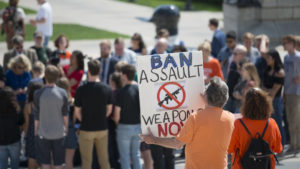
Political process in action
Once again, the cycle continues of a mass shooting in America, followed by a public outcry to do something, followed by Republican charges that Democrats are “politicizing gun violence.” It happened again this week, in the aftermath of the school shooting in Nashville, Tennessee, which involved an AR-style assault weapon and an AR-style pistol, and claimed the lives of three young school children and three adults. Reaction to the shooting included one mother who took over a Fox “News” live stream following a press conference at the scene, saying that she and her son had survived the shooting, and that:
How is this still happening? How are our children still dying and why are we failing them?
These shootings… will continue to happen until our lawmakers step up and pass gun safety legislation.
Democrats support and propose such gun safety legislation, and indeed, President Joe Biden and other Democrats called for a renewed Assault Weapons Ban after Monday’s Nashville school shooting. But the only response to the shooting from Republicans is to avoid talking about guns. On Monday, for example, Republican U.S. House Judiciary Committee Chair Jim Jordan postponed a committee meeting at which he and his Republican colleagues planned to nullify a recent rule by the Bureau of Alcohol, Tobacco, Firearms and Explosives which defined firearms with stabilizing braces (allowing firing from the shoulder) as “rifles” subject to registration and other requirements. In postponing their action, Jordan stated that “Democrats were going to turn this tragic event into a political thing.” That charge is another Republican myth, and we will show why.
First, under the U.S. Constitution, our government is designed to get things done through a political process. Fundamentally, that means that we have elections to choose federal, state and local officials (presidents, U.S. Senators and Representatives, state Senators and Representatives, Mayors, etc.), and they in turn appoint other office holders such as agency and department heads. Obviously, such elections are a wholly political process. Then, in between elections, citizens can try to tell these representatives and officials what to do. More formally, that’s referred to as “lobbying” the government. Of course, such lobbying can get distorted by big money, for example, from powerful groups such as the National Rifle Association (NRA), which typically opposes any and all gun safety measures, and other corporate lobbyists.
The First Amendment to the Constitution likewise protects the more general right to “petition the government for a redress of grievances” and “the right of the people peaceably to assemble.” These rights include, therefore, the right to publicly (and peacefully) protest in the streets, sign written petitions, send letters or emails to officials, phone their offices, and more. Ultimately, if such elected officials are not responsive to the people, the voters, again in a purely political process, can replace the officials when they face re-election.
Thus, the idea put forth by Republicans that some event, crisis or problem such as a school shooting is the wrong time for citizens to activate this political process and petition the government for action, or for elected Democrats to propose or take action, goes completely against our system of government. The aftermath of a school shooting, when public attention and the news media are focused on the subject, is precisely the right time to demand that our elected officials do something to solve the problem.
By the same token, Chairman Jordan and other Republicans on the House Judiciary Committee were also sensitive to the rather awful political optics of relaxing gun safety rules immediately after the Nashville school shooting tragedy; thus they postponed their action. That itself was a form of “politicizing” the issue of gun violence, and again, is exactly how our government is designed to work, i.e., to be responsive to the people.
Additionally, notice how Republicans do not follow their own prescription when it comes to items on their docket, such as immigration, abortion or starting wars against “terrorist” regimes. In those and other cases, Republicans are quick to cite what they claim is a “crisis,” and to take or propose swift action. For example, after the 9/11 attacks, Congress passed and President George W. Bush signed the Authorization for Use of Military Force, which permitted the U.S. to attack Afghanistan, within just one week.
Rather than having some principled stand against “politicizing” an issue in times of crisis, the Republican methodology seems to be: If it’s an item on the Democratic agenda that hurts Republicans politically, “we can’t talk about that now, because that would be politicizing the issue.” But if it’s an item on the Republican agenda that helps them politically, they will politicize the hell out of it, right away.
Photo by Fibonacci Blue, used under Creative Commons license. https://is.gd/kUi45d


